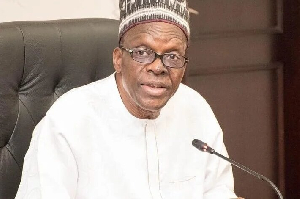Accra (Greater Accra), 22nd March '99 -
Mr Charles Adjei, Managing Director of the Ghana Water and Sewerage Corporation (GWSC), on Monday underlined the need for a sustained rational use of water if the resource is to be available in the next millennium. He said those who use water as though it is unlimited "need to learn the true value of this precious commodity ... and contribute to fair pricing, not only as a means of an effective demand management tool, but to enable GWSC build some level of independent capacity to expand services ...". Mr Adjei made these remarks at a flag-hoisting ceremony to mark the World Water Dayin Accra. The day is set aside to bring to the notice of consumers and all other stakeholders the need to keep water bodies and sources safe from contamination and urged the people to use the resource wisely. Mr Adjei said urban service delivery will soon be accelerated by exploiting the advantages which private sector involvement will bring and that current estimates put investment needed to achieve set targets of the corporation at 1.5 billion cedis for the urban sector alone. The GWSC boss said in 1992, the corporation undertook a water supply and sanitation survey which put urban coverage at 76 per cent. " Presently, we estimate that effective urban coverage has dropped to about 71 per cent," a figure described by consumers as still on the low side especially in the face of the rising costs of tariffs. The GWSC plans to put urban water supply at 100 per cent by 2010 and sustain it through 2020. The demand for increased water supply for domestic and other uses continues to rise geometrically as a result of increased population, improved living standards and increased economic activity. Rural water service delivery coverage is currently at 50 per cent; the 1992 figure was 45 per cent. Mr Adjei regretted that the nation continues to act as if fresh water were a perpetually abundant resource, and that "if we continue the trend of viewing potable as a cheap social commodity, ... we maybe forcing scarcity to teach us the truth". Mr Isaac Adjei-Mensah, Minister of Works and Housing, said four complementary approaches have been recommended for adoption by policy makers which include setting priorities based on the desires of the beneficiaries and the adoption bottom-up planning to ensure that the voice of the people are heard and that investments match needs. He also said government has started taking bold initiatives and formulated strategies to fully achieve these aims long before the regional consultation dubbed "Africa 2000". " To ensure our objectives, a dynamic policy formulation and implementation process is being followed".
Click to view details



Business News of Monday, 22 March 1999
Source: --
















